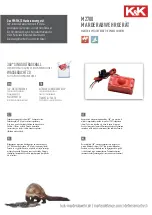
DL06 Micro PLC User Manual, 3rd Edition, Rev. E
5-108
Chapter 5: Standard RLL Instructions
1
2
3
4
5
6
7
8
9
10
11
12
13
14
A
B
C
D
NOTE: Status flags are valid only until another instruction uses the same flag.
In the following example, when X6 is on, the value formed by discrete locations X0–X3 is
loaded into the accumulator using the Load Formatted instruction. The value formed by
discrete locations C0–C3 is multiplied by the value in the accumulator using the Multiply
Formatted instruction. The value in the lower four bits of the accumulator is copied to Y10–
Y13 using the Out Formatted instruction.
bbb
K
MULF
A aaa
DirectSOFT32 Display
LDF
X0
K4
X6
Load the value represented
by discrete locations X0--X3
into the accumulator
MULF
C0
K4
Multiply the value in the
accumulator with the value
represented by discrete
locations C0--C3
OUTF
Y10
K4
Copy the lower 4 bits of the
accumulator to discrete
locations Y10--Y13
0
6
0
0
0
0
0
0
0
0
0
0
0
0
0
3
(C0--C3)
(Accumulator)
2
X0
X1
X2
X3
ON
ON
OFF
OFF
C0
C1
C2
C3
OFF
ON
OFF
OFF
Y10
Y11
Y12
Y13
OFF
ON
ON
OFF
The unused accumulator
bits are set to zero
Acc.
Handheld Programmer Keystrokes
STR
$
SHFT
ISG
U
ANDST
L
OUT
GX
SHFT
5
F
0
A
4
E
ENT
6
G
ENT
1
B
4
E
0
A
ENT
SHFT
ANDST
L
3
D
0
A
4
E
ENT
5
F
5
F
ORST
M
NEXT
NEXT
NEXT
NEXT
X
Operand Data Type
DL06 Range
A
aaa
bbb
Inputs
X
0–777
––
Outputs
Y
0–777
––
Control Relays
C
0–1777
––
Stage Bits
S
0–1777
––
Timer Bits
T
0–377
––
Counter Bits
CT
0–177
––
Special Relays
SP
0-137 320-717
––
Global I/O
GX
0-3777
––
Constant
K
––
1–16
Discrete Bit Flags
Description
SP63
On when the result of the instruction causes the value in the accumulator to be zero.
SP70
On any time the value in the accumulator is negative.
SP75
On when a BCD instruction is executed and a NON-BCD number was encountered.
DS
Used
HPP Used
Direct
SOFT
Multiply Formatted (MULF)
Multiply Formatted is a 16-bit instruction that multiplies the
BCD value in the accumulator by the BCD value (Aaaa) which
is a range of discrete bits. The specified range (Kbbb) can be 1
to 16 consecutive bits. The result resides in the accumulator.
















































